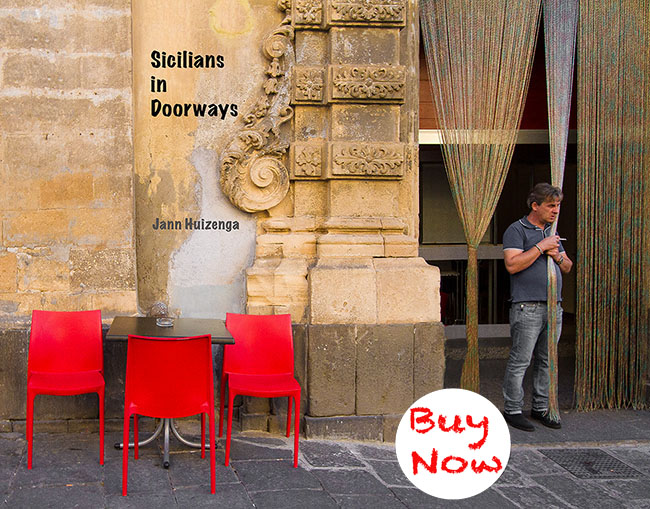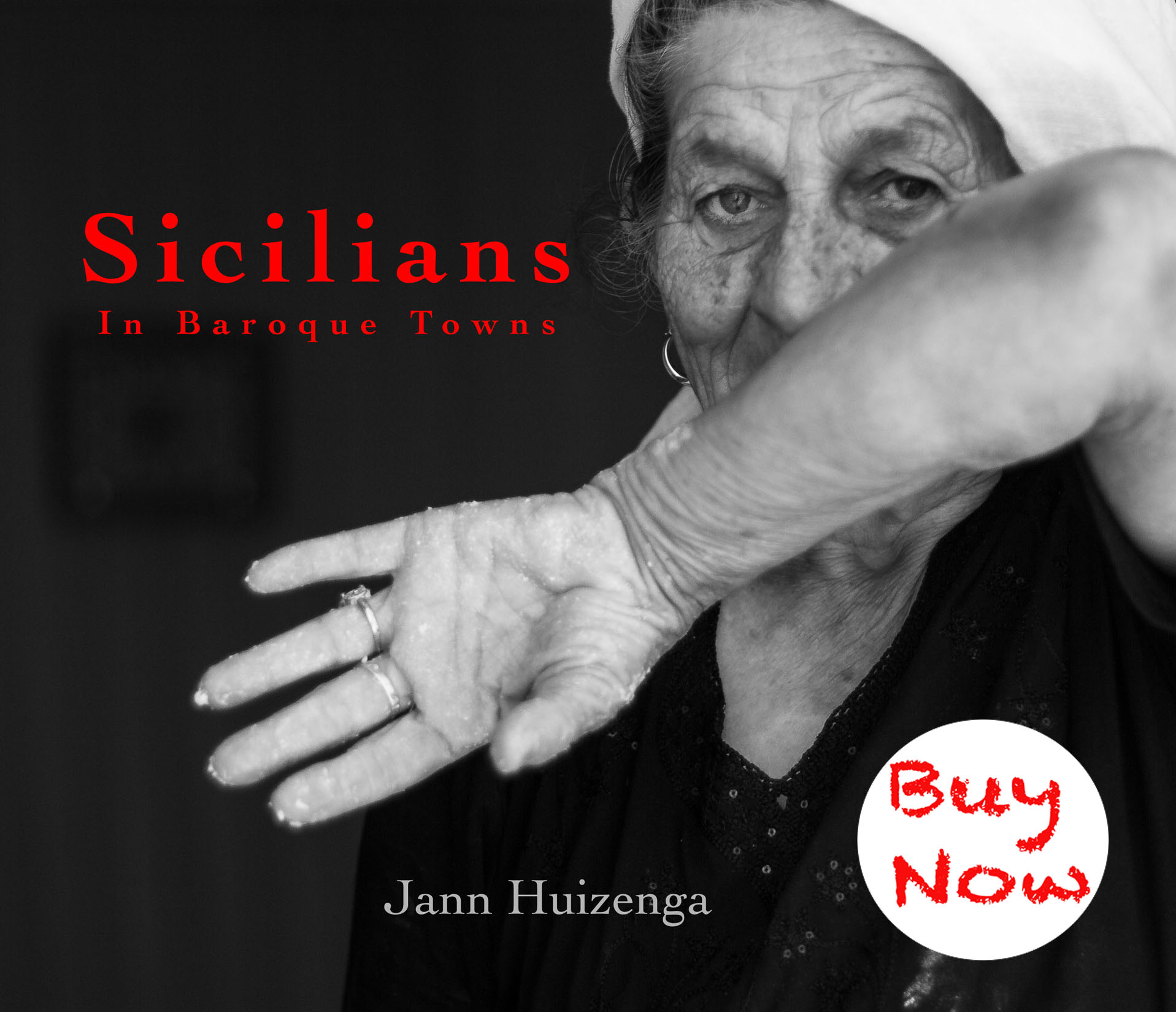November 11, 2009
After gorging yesterday on focaccia con funghi and cannoli con crema—typical Sicilian fare—I swore I was going to diet today.
But when I swatted away the plastic bead curtain of my local bakery this morning looking for a small roll, a magnificent mound of deep-fried, sugar-dipped fritelle greeted me.
It’s November 11, San Martin’s Day, the baker patiently explained, and we always eat fritelle on this day. I asked her to put one in my bag.
“With raisins or chocolate?” she asked.
In the name of research, I got both. Here they are precariously perched on the railing of my balcony, against the backdrop of Ragusa Ibla’s San Giorgio cathedral.
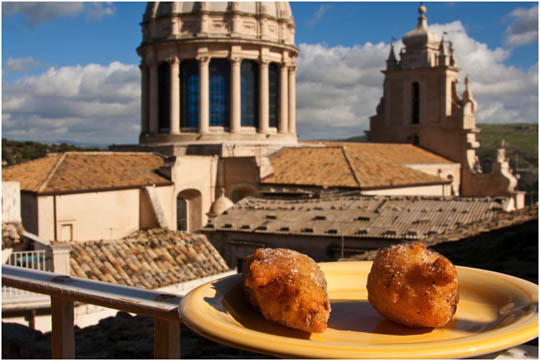
I wish you could hear how wildly the bells are clanging in the bright blue air as I bite into these pillow-soft fritelle. They are like glorified warm donut holes, perfumed with fennel.
On November 11, San Martino, new wine is considered ready to drink for the first time. The new wine should be enjoyed, or so said my smiley baker, with typical Ragusan dishes—ricotta-filled ravioli as a first course, pork chops as a second. And fritelle for dessert. But never mind, I made them my main course and washed them down with an old wine.
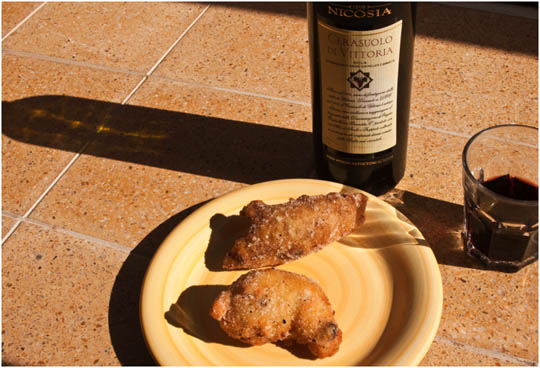
November 2, 2009
A few years ago, I wanted to buy a ruin of a house on a solitary road out beyond the Ragusa cemetery. Sicilian friends (perfectly rational, well-educated ones) said I was matta, insane, that I’d be visited at night by dead souls.
“What do you mean?” I hollered. “I live two blocks from a cemetery in the US and I’ve never seen a ghost!”
They looked at me mournfully and insisted that the danger was real. They themselves would absolutely never pay me a visit there!
So I gave up the idea of that house with its faded pink walls, shocked at how alive the dead are in Sicily.
Sicilian cemeteries are always set well outside of town behind imposing walls. Below is the Scicli cemetery, full of mausoleums, magnificent pines and tall cypress.

Cemeteries here are well-tended, with custodians and on-site florists. They seem to be open most of the day, even during the long lunch break.


Many of the tombs show pictures of the dead.

Streets have names, just like in a real town.

Today is il Giorno dei Morti, Day of the Dead. Sicilian families flock to cemeteries—arms overflowing with lilies, mums, roses, and daisies—to spend time with their dearly departed.

October 26, 2009
It’s persimmon season in Sicily. The hawkers are plying town with truckloads of ripe persimmons—fruit of the gods, according to the Greeks, and guaranteed, according to my hawker, to put a blush on your cheeks, thicken your hair, double your energia.
The roving vendor parks his truck smack dab in front of my portone and starts shrieking “Cachi!” (pronounced like khaki, but with the accent on the last syllable in Sicilian). Housewives rush out in their slippers.
Persimmons have scared me ever since my husband and I each yanked a pretty yellow fruit off a Montenegrin tree a quarter century ago and greedily bit into the under-ripe flesh. One never forgets that nasty cotton-mouth taste.
But I’m learning. I bought these four persimmons yesterday. The two in the foreground are not yet ripe, the vendor warned. Non mangiare adesso!
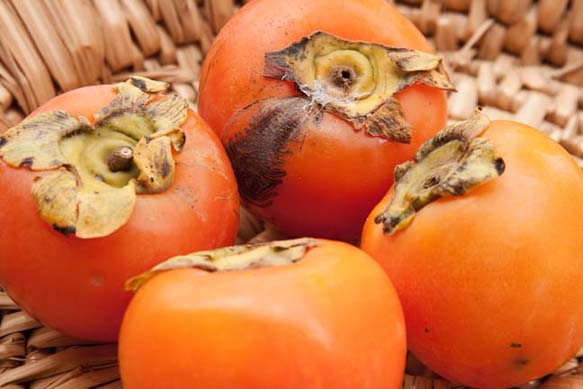
They need to turn from a yellowish/pumpkin-y color to a reddish/tomato-y hue, (like the two in the background), and they should develop a black spot or two to indicate they’re ready to eat, or so said my Sicilian expert.
I’ve just eaten the persimmon with the black spot on it, and it was so incredibly sweet and soft I practically drank it down. Liquid fruit. The opposite of cottony.

Pears from Bronte—a town on the flanks of Mt. Etna and famous for its pistachios—are also in season. They’re tiny and soft and sweet and I eat three at a time.
October 12, 2009
Fog comes like a ghost to Ragusa Ibla some mornings in autumn. It shrouds the village in soft silence and mystery—or should I say more mystery, for there’s something inherently secretive and mystifying about Sicilian hill towns.
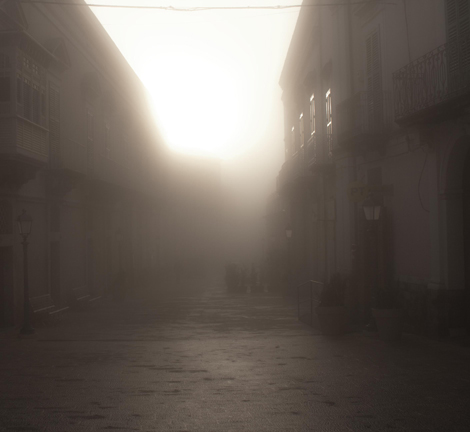
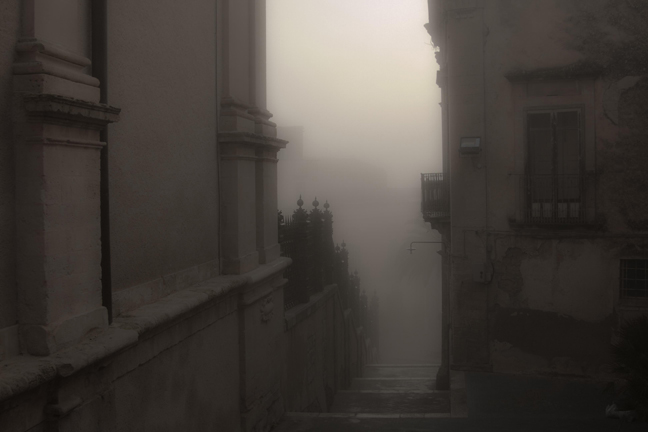
That otherworldly feeling evaporates well before mid-morning in Ibla, when the sun comes burning through. The ghost may settle much longer in the low places, though.
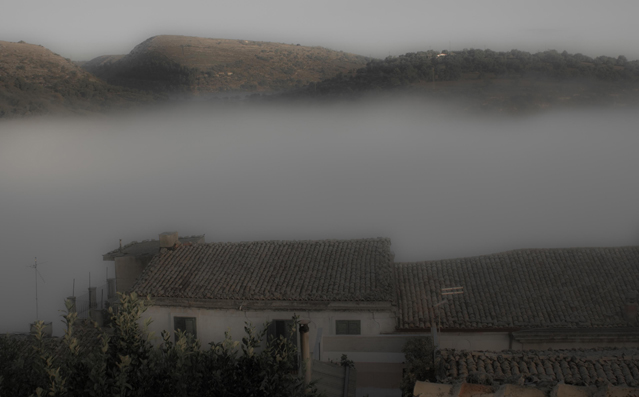
My neighbors tell me that the fog is new, that it first rolled in when la diga, the dam, was built outside of town several years ago. The mist lifts off the water of Santa Rosalia Lake, a beautiful place on the Ragusa Ibla-Giarratana road (SS194). I recommend driving along this charming, curvy little road (but not when it’s foggy!) and stopping at the lake for its wonderful vistas. I hear the fishing is good too.
September 17, 2009
How you display your laundry to the world is importantissimo in Sicily. Take my neighbor across the alley—a young mom who fries fish every Friday. She’s a pro. The last time I looked she had hung orange sheets and towels together, each item pinned neatly to the next. In the soft breeze, they were like bright wings, soaring and diving, diving and soaring. I fell into a trance.

“It’s an art form,” my Sicilian-American friend Mary explained one day when I tried to help her hang some shirts on a line at her house in Módica. She yanked the clothespins right out of my hand. “You’re judged here by your clothesline—as much as you are by your clothes.” Socks must stick together, like la famiglia italiana, and cannot tolerate an interloper like, say, a bra, in their midst. Each sock must hang near its mate, carefully clipped at the toe. Colors must be strictly segregated.
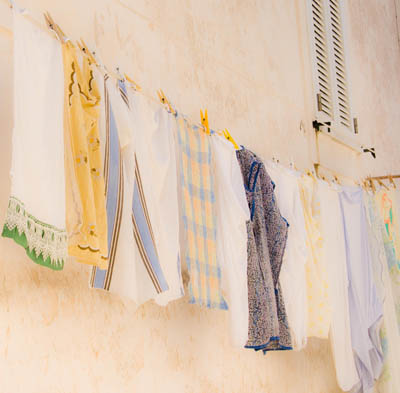
Blacks flap with blacks; whites with whites.


It’s all about sistemare: the highest Italian virtue. Neighbors study your underwear. If it’s sexy, you’re having an affair. If it’s dingy, you’re down on your luck. If you don’t hang it out often enough, you’re a filthy pig.
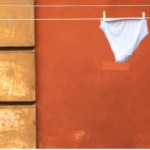
I’ll never forget my first attempt at doing a wash here one Sunday last November. I’d been in the house nearly a month and imagined that the neighbors must be talking. She never washes sheets! Sheets? Madonna, she doesn’t even do underwear! After foraging around town, I’d found twenty wooden clothespins. The line was ready. I used three buckets in a defunct shower stall, pulling cold water from a low faucet. I soaped in one pail, rinsed in the other, and hauled the hand-wrung laundry up to the top floor in the third. The cathedral bells tolled nine, but other than that it was eerily quiet. I hung a few mismatched towels and paint-splattered jeans, all wrong I know. Then I noticed that the tangle of lines in the rest of the alley was empty. Was it taboo to do a wash on a Sunday morning? Had I once again broken the rules of Sicily?
Lines here hang directly over the street on wrought iron curlicues so that the water drips on passersby, not on your balcony. But this means you have to stretch out over the void to pin your laundry, not easy for an acrophobe like me. I tried to pin my lacey undies, but lost my grip. They floated down, past neighbors’ open windows. A puff of air carried them east, and then splat, onto the cobbles. Exit a black-clad widow I’d never seen before—but who surely knew me. Why, damn it, did she have to choose that very moment? She feasted her eyes on the foreign object, glowered up at me, and continued on her way to mass. I flew down three flights of stairs, unhinged the noisy rusty bar that secured the double doors, and slunk into the alley to retrieve it.

|
Subscribe to Baroque Sicily
Copyright reserved -
All photos and text on BaroqueSicily are Copyright of Jann Huizenga ©2009-2015, unless otherwise noted. Material may not be copied or re-published without written permission. All rights reserved.
|



















